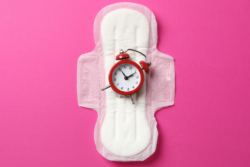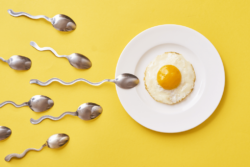When couples are attempting to conceive, it’s often the person who will carry the pregnancy who feels the pressure and responsibility to be healthy and fertile. This is often because the womb provides the energy, sustenance, blood supply, and nutrition for the growing fetus.
But what about in our pre-conception stage?
It’s no secret that sperm is a critical part of fertility and conception — so it can’t be overlooked.
What is infertility?
Infertility describes those who have been trying, unsuccessfully, to conceive for over a year — and male factor infertility accounts for 40-50% of these cases.
These factors include:
- Sperm production problems: Infection, testicular injury or varicoceles, drug use, and/or DNA fragmentation;
- Physical blockage of sperm transport;
- Sexual problems, including erectile dysfunction; and
- Idiopathic (“unexplained”) reasons, which account for 30% of infertile men.
Unexplained male infertility is largely attributed to diet and lifestyle and may be associated with poor nutrition and diet, alcoholism, smoking, marijuana use, and toxicity or exposure to toxins. Many of these factors are intertwined with hormonal dysregulation, resulting in abnormal levels of testosterone, estrogen, follicle-stimulating hormone (FSH) and luteinizing hormone (LH).
Male health and Spermatogenesis
It takes about 100 days to produce sperm as they undergo normal development and maturation. During development, young sperm cells are extremely susceptible to damage from toxins, but also from oxidative damage from the accumulation of compounds called “reactive oxygen species” (ROS). This damage leads to DNA fragmentation and/or poor sperm count and quality.
Your body contains antioxidants that neutralize these ROS, such as vitamin C and vitamin E. However, when the rate of ROS production exceeds antioxidant reactions, sperm are vulnerable to damage. Obesity, specifically, has been linked to increases in this DNA damage of sperm. These changes have even been transmitted to offspring by altering sperm DNA. In cases of unexplained male infertility, higher concentrations of antioxidants may be needed through supplementation. One recent study showed that vitamin C dosed at 1g daily improved sperm concentration and motility.
Obesity and Testosterone
Research has shown that obese men are at a greater risk for developing low hormone function, impaired sperm production, and erectile dysfunction.
There are many ways by which sperm production is affected by obesity, ranging from thermal effects to increased estrogen levels and lower testosterone levels.
Adipocytes (fat cells) release a hormone called leptin. When leptin levels are chronically elevated, men can develop “leptin resistance” which results in decreased testosterone levels. Additionally, insulin resistance and sleep apnea can both down-regulate testosterone and the androgenic axis.
The higher estrogen and lower testosterone levels that develop from these pathways lead to decreases in FSH, sex hormone-binding globulin (SHBG), and an overall reduction in sperm development. Even more so, high estrogen levels in men upregulate the immune cells in the testicles, essentially destroying/removing the testosterone-producing cells.
Studies have shown that overweight and obese men are at a higher risk of decreased sperm count and semen volume, as well as DNA fragmentation causing effects of low sperm motility. Reducing body fat mass of infertile male partners can help increase the production of testosterone and restore the healthy function of hormonal pathways.
Diet and Semen Quality
Recent studies of lifestyle factors and sperm quality have shown that diet and nutritional factors play an important role in sperm production. Low intakes of dairy, sugar, and processed meat, along with a high intake of fruits, vegetables and healthy fats such as olive oil and fish, favourably lead to less DNA damage in sperm. Healthy diets in men have also been associated with higher sperm concentrations, sperm count, and motility.
Other studies have shown that testosterone levels are positively affected by high intakes of fish, chicken, fruits, cruciferous vegetables, tomatoes, and leafy green vegetables. Diets consisting of these foods have also been associated with a lower incidence of chromosomal disorders in offspring.
Take-Home Points …
Infertility investigations in men are crucial for people trying to conceive. Infertility notwithstanding, couples in the pre-conception phase should be taking 3-6 months to address health concerns and adjust diet and lifestyle factors.
The safest way to obtain a healthy body composition is through a healthy diet and regular exercise, which tends to result in a gradual, progressive, and sustained weight loss and overall improved health. A healthy reduction in body fat mass in obese infertile men can improve hormone function and testosterone production.
Additionally, antioxidant support may be helpful in improving sperm health parameters but should be appropriately prescribed through a naturopathic doctor or other health care provider.
To learn more about how you can support your fertility, or to book an online appointment with a Conceive Health ND, contact us today.
References
1. Craig, J.R., Jenkins, T.G., Carrell, D.T., and Hoteling, J.M. Obesity, male infertility, and the sperm epigenome. (2017) Fertil Steril. 107(4): 848-59
2. Yu, W., Zheng, H., Lin, W., et al. Estrogen promotes Leydig cell engulfment by macrophages in male infertility (2014) J Clin Invest. 124(6): 2709-21
3. Rafiee, B., Horowvat, M.H., and Rahimi-Ghalati, N. Comparing the effectiveness of dietary vitamin C and exercise interventions on fertility parameters in normal obese men. (2016) Urol J. 13(2): 2635-9
4. Broughton, D.E., and Moley, K.H. Obesity and female infertility: potential mediators of obesity’s impact. (2017) Fertil Steril. 107(4): 840-7
5. Belloc, S., Cohen-Bracrie, M., Amar, E, et al. High body mass index has a deleterious effect on semen parameters except morphology: results from a large cohort study. (2014) Fertil Steril. 102(5): 1268-73
6. Oostingh, E.C., Regine, P.M., Steegers-Theunissen, M.D., et al. Strong adherence to a healthy dietary pattern is associated with better semen quality, especially in men with poor semen quality. (2017) Fertil Steril. 107(4): 916-23.e2
7. Meldrum, D.R. Introduction (2017) Fertil Steril. 107(4): 831-2









